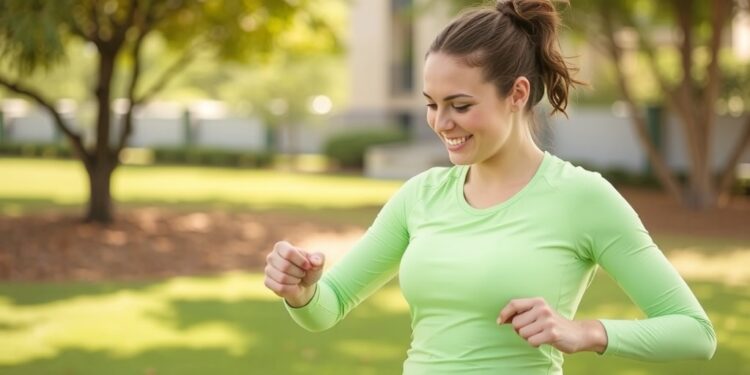
New mothers often find themselves navigating a myriad of changes in the months following childbirth, and physical activity plays a crucial role in supporting their recovery and overall well-being. The latest guideline published by the British Journal of Sports Medicine emphasizes the necessity for new mums to integrate at least two hours of moderate to vigorous physical activity into their weekly routine during the first three months postpartum. This recommendation comes from a comprehensive review of 574 studies, marking a significant advancement in understanding the importance of physical activity at this critical stage of life.
New mothers are often bombarded with advice on various aspects of motherhood, yet the area of postpartum physical activity has remained considerably under-discussed. As these fresh parents juggle the demands of caring for a newborn and managing their own recovery from childbirth, it’s essential to encourage engagement in physical activities such as brisk walking and muscle-strengthening exercises. These activities are not merely beneficial; they are crucial in mitigating postnatal complications including depression, sleep disorders, and even chronic diseases that can arise from prolonged inactivity.
The guidelines put forth by a panel of expert researchers and clinicians resonate with the real experiences of new mothers. They recommend that within the first twelve weeks after giving birth, women who are physically able should aim for a mixed regimen of aerobic activities and resistance training, aiming for 120 minutes spread across four days or more weekly. This structure strikes a balance between recovery and the gradual resumption of a healthy lifestyle, harnessing the body’s natural capacity for healing while promoting physical vitality.
In addition to physical exercise, an emphasis is placed on daily pelvic floor muscle training to significantly lower the risk of urinary incontinence. This is particularly critical considering the strains placed on pelvic muscles during pregnancy and delivery, which can lead to long-term health issues if not addressed properly. Furthermore, establishing a healthy sleep routine is highlighted in the guidelines as an integral part of postpartum care. Quality sleep, paired with meaningful physical activity, builds a solid foundation for mental health, reducing the likelihood of perinatal mood disorders.
It’s important to note that the guidelines acknowledge varying abilities among new mothers. For those with underlying health conditions or manifestations that hinder physical activity, medical consultation is strongly advised. This approach allows for personalized pathways to recovery, ensuring that all women can engage in some form of movement tailored to their specific circumstances. The message is clear: while tailored physical activity recommendations are important, all new mothers should remain active, even if through light activities like walking, to counteract the adverse effects of a sedentary lifestyle.
As society increasingly recognizes the multidimensional nature of postpartum recovery, the integration of these guidelines into clinical practice will be pivotal. Encouraging movement not only fosters physical growth but also cultivates mental resilience. Pregnant individuals often feel isolated during their transition into motherhood, and physical activity can serve as a unifying force, encouraging social interactions and building supportive communities among new mothers.
Additionally, the health benefits attributed to following the proposed guidelines extend beyond immediate recovery. Research indicates that adherence could contribute to improved long-term health metrics, including reductions in lower back pain, better management of weight, and favorable cholesterol levels. Perhaps most notably, the risk of injury or adverse effects on breastfeeding quality is not increased when one engages in recommended physical activity, alleviating the concerns that many new mothers may have about exercising post-birth.
The expert panel responsible for these guideline recommendations stressed the importance of realistic, achievable goals rather than unattainable benchmarks that could lead to feelings of failure or disappointment. Even incremental changes, such as opting for stairs instead of elevators or taking short walks with the baby, can positively impact health and mental well-being. Thus, the premise is not solely about structured exercise; rather, it’s about fostering an active lifestyle woven into the fabric of everyday life for new mothers.
To further bolster this initiative, there is an appeal for future research to explore gaps in literature related to postpartum experiences and recovery. The experts assert that clinical practice must evolve and incorporate these recommendations, positioning them as a standard of care in postpartum healthcare. Doing so will enable health professionals to provide new mothers with the support they need to thrive during this transformative period.
The potential cost-effectiveness of implementing these guidelines cannot be overstated. By fostering health and reducing the incidence of postpartum complications, both healthcare systems and individual mothers stand to benefit substantially. Minimal costs associated with these recommendations could yield significant savings, aligning public health interests with personal well-being.
In conclusion, the latest guidelines represent a clarion call for both new mothers and healthcare practitioners. They provide a structured framework for understanding the importance of physical activity and holistic care in the postpartum journey. Through careful implementation of these guidelines, new mothers can cultivate healthier lifestyles, improved mental health, and enhanced quality of life during a pivotal time.
The pathway to recovery after childbirth is undeniably complex and fraught with challenges. However, the incorporation of these evidence-based recommendations into both community support systems and clinical practices offers a roadmap toward a healthier, more energized life for new mothers. By embracing physical activity alongside strategic mental health support, we can better reflect the nuanced needs of new mothers and facilitate their journey into motherhood with confidence and vitality.
Subject of Research:
Article Title:
News Publication Date:
Web References:
References:
Image Credits:
Keywords:
Tags: benefits of exercise after childbirthbrisk walking for postpartum healthexpert advice for new mothers on fitnesshealth risks of inactivity after childbirthimportance of physical activity for new mumsmanaging postpartum depression through exercisemoderate to vigorous exercise for new mothersmuscle-strengthening exercises for new mothersovercoming challenges of postpartum exercisepostpartum physical activity guidelinespostpartum recovery and well-beingrecommendations for new mothers’ exercise





